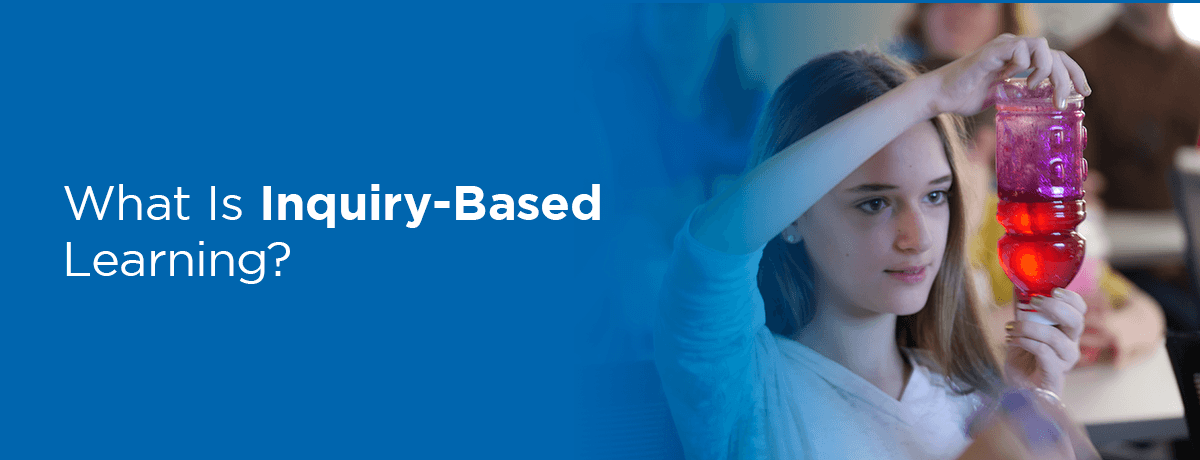Enrollment Now Open for Second Semester. Click Here
Enrollment Now Open for Second Semester. Click Here

Engaging students in the classroom helps them remain interested in their studies and prevents learners from feeling bored or disconnected. Though most instructors want to deliver materials that pique student interests, finding a method that works for everyone and strengthens student comprehension isn’t always easy.
Inquiry-based learning is a learning approach that encourages students to share ideas, question materials, and investigate topics. This approach introduces students to learning methods that span beyond traditional lecture-style classes. Rather than memorizing facts and showing their knowledge on exams, students display their expertise and understand schoolwork by completing projects, experiencing materials firsthand, and having thought-provoking discussions.
The inquiry-based learning model takes students through five stages to help learners draw connections and educators make decisions about student interactions. The five phases are engage, explore, explain, elaborate, and evaluate. When students learn this way, they can develop critical thinking abilities and generate a sense of accomplishment.
Inquiry-based learning is most effective when instructors use it to introduce concepts because students can undergo a complete learning process. When instructors properly use this model, students can benefit significantly. Studies have shown 5E positively affects student achievement and knowledge permanence.
The engagement phase is the beginning of the learning process. At this time, instructors will gauge students’ knowledge and determine if there are any misconceptions about the material. Instructors should spark a desire for students to learn more about the upcoming topic during this phase and avoid lecturing, explaining, or defining terms and concepts. However, teachers can ask students whether they have any questions beforehand or ask students to express what they think they will learn or what they’re most excited to learn about the topic.
Through hands-on, inquiry-based learning projects, students can gather a joint knowledge base during the exploration phase. Students can use their knowledge to draw connections to the new material and start thinking about where the topic will move next. Learners can communicate with peers about observations and conclusions.
During the explanation stage, teachers use the students’ experience from the previous step to strengthen understanding. Instructors can provide formal definitions, give explanations, and clear misconceptions the students may have. Students can make connections, ask questions about their experience, and reflect on how or what they may have done to interact with the concept.
During the elaboration stage, students apply their understanding and reinforce new skills. Educators can ask students to complete further research by making presentations, completing another project, or doing some other activity to further strengthen comprehension. This stage enables instructors to apply the topic to other materials so students can create a lasting real-world connection.
During the final phases of the inquiry-based learning model, students assess their understanding, and instructors evaluate student progress. Evaluation can be in the shape of informal or formal assessments, including peer assessments, self-assessments, exams, or written assignments. During this stage, instructors evaluate whether students take a new approach to reach conclusions based on their unique experiences.
Bringing inquiry-based learning to the classroom begins with the instructor. Teachers must lead students and encourage them to explore and discuss new concepts. They must determine whether the class would benefit from group discussions and guide transitions between topics. Instructors must be aware of the conversations occurring to clarify misunderstandings and prevent misconceptions from arising.
There are many ways to implement project-based learning to encourage students to gain hands-on experience and interact with materials.
You can implement these approaches in every classroom. For example, a language teacher can encourage students to explore “Lord of the Flies” by leaving the classroom for a few sessions. Math teachers can present equations before the lesson plan and observe how students solve the problem before knowing standard methods. Science classes can ask students to formulate a hypothesis about a topic before exploring it. History instructors can break students into three groups to act as different branches of government to understand the role each plays before learning their formal duties.
Inquiry-based learning provides students with an experimental foundation they can use to deeply understand topics and draw connections between multiple materials and classes. This learning approach has many benefits— students and teachers can enjoy the process from start to finish.
Inquiry-based learning benefits include the following.
Commonwealth Charter Academy uses personalized learning to engage and interest every learner. A one-size-fits-all approach is ineffective, so we build our curricula to align with student goals and interests to guide them toward success.
At CCA, your student can experience high-quality education in a flexible learning environment. Your child can interact with peers and instructors to drive interesting conversations and explore new topics in a dynamic setting. With career pathways and custom learning goals, your student can develop a lifelong learning habit and build strong relationships that last a lifetime.
Contact CCA to learn more about our program and how your student can benefit from inquiry-based learning.
Enrollment Now Open for Second Semester. Click Here